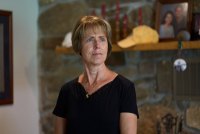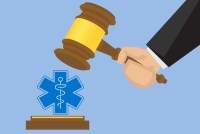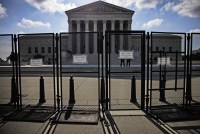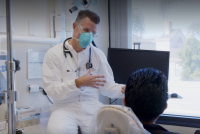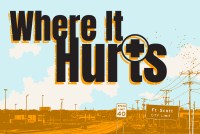Latest KFF Health News Stories
Buy and Bust: Collapse of Private Equity-Backed Rural Hospitals Mired Employees in Medical Bills
The U.S. Labor Department investigates Noble Health after former employees of its shuttered Missouri hospitals say the private equity-backed owner took money from their paychecks and then failed to fund their insurance coverage.
KHN’s ‘What the Health?’: Kansas Makes a Statement
In the first official test vote since the Supreme Court overturned Roe v. Wade, voters in Kansas’ primary said in no uncertain terms they want to keep a right to abortion in their state constitution. Meanwhile, the Senate is still working to reach a vote before summer recess on its health care-climate-tax measure, but progress is slow. Tami Luhby of CNN, Sandhya Raman of CQ Roll Call, and Rachel Cohrs of Stat join KHN’s Julie Rovner to discuss these issues and more. Also this week, Rovner interviews KHN’s Bram Sable-Smith, who wrote the latest KHN-NPR “Bill of the Month” installment about a very expensive ambulance trip.
Conservative Blocs Unleash Litigation to Curb Public Health Powers
Spurred on by opposition to pandemic-related health mandates, a coalition of religious liberty groups, conservative think tanks, and Republican state attorneys general has filed a cascade of litigation seeking to rein in the powers of public health authorities.
Rural Hospital Rescue Program Is Met With Skepticism From Administrators
A new federal rescue program that pays rural hospitals to shutter underused inpatient units and focus solely on emergency rooms and outpatient care hasn’t generated much interest yet.
Five Things to Know Now That the Supreme Court Has Overturned Roe v. Wade
By undoing that landmark decision, the law of the land since 1973, the court has empowered states to set their own abortion restrictions — so where people live will determine their level of access.
Upended: How Medical Debt Changed Their Lives
People talk about the sacrifices they made when health care forced them into debt.
Buy and Bust: When Private Equity Comes for Rural Hospitals
Noble Health swept into two small Missouri towns promising to save their hospitals. Instead, workers and vendors say it stopped paying bills and government inspectors found it put patients at risk. Within two years — after taking millions in federal covid relief and big administrative fees — it locked the doors.
They Thought They Were Buying Obamacare Plans. What They Got Wasn’t Insurance.
Some consumers who think they are signing up for Obamacare insurance find out later they actually purchased a membership to a health care sharing ministry. But regulators and online advertising sites don’t do much about it.
KHN’s ‘What the Health?’: Washington’s Slow Churn
Stemming gun violence is back on the legislative agenda following three mass shootings in less than a month, but it’s hard to predict success when so many previous efforts have failed. Meanwhile, lawmakers must soon decide if they will extend current premium subsidies for those buying health insurance under the Affordable Care Act, and the Biden administration acts, belatedly, on Medicare premiums. Margot Sanger-Katz of the New York Times, Sandhya Raman of CQ Roll Call, and Rachel Cohrs of Stat News join KHN’s Julie Rovner to discuss these issues and more. Also this week, Rovner interviews KHN’s Michelle Andrews, who reported and wrote the latest KHN-NPR “Bill of the Month” episode about a too-common problem: denial of no-cost preventive care for a colonoscopy under the Affordable Care Act.
Montana Hires a Medicaid Director With a Managed-Care Past
Montana, one of about a dozen states still managing its own Medicaid programs, has a new Medicaid director who championed handing the management of the program to private companies in Iowa and Kansas.
Travel Nurses See Swift Change of Fortunes as Covid Money Runs Dry
Travel nurse contracts that were plentiful and paid the temporary nurses far more than hospital staff nurses are vanishing. Hospitals nationwide are turning their energies to recruiting full-time people.
Anti-Vaccine Ideology Gains Ground as Lawmakers Seek to Erode Rules for Kids’ Shots
Legislators in Kansas are pushing bills to expand exemptions for school vaccines, allowing religious exemptions for all vaccine requirements in the state’s schools without families having to provide any proof of their beliefs. Similar bills are being introduced around the nation as the anti-vaccine movement gains traction among politicians.
Missouri Tried to Fix Its Doctor Shortage. Now the Fix May Need Fixing.
Five states have created “assistant physician” licenses that allow medical school graduates to practice without completing residency training. But a federal indictment in Missouri of one assistant physician has some original supporters trying to rein in the medical specialty.
Desperate for Cash: Programs for People With Disabilities Still Not Seeing Federal Funds
Almost a year after the American Rescue Plan Act allocated what could amount to $25 billion to home and community-based services run by Medicaid, many states have yet to access much of the money due to delays and red tape.
Patient, Beware: Some States Still Pushing Ineffective Covid Antibody Treatments
The top 12 states using antibody therapies produced by Regeneron and Lilly — which research shows don’t work against the omicron variant — include several Southern states with some of the nation’s lowest vaccination rates, but also California, which ranks among the top 20 for fully vaccinated residents.
Quarantine and Tracing Rules Are All Over the Map for Students
The Centers for Disease Control and Prevention offers guidance but calls for localities to set quarantine rules for unvaccinated children exposed to someone with covid-19. That’s led to a pandemic patchwork of rules.
Cómo las comunidades rurales están perdiendo sus farmacias
Las farmacias de las esquinas, que alguna vez estuvieron tanto en las grandes ciudades como en los pueblos rurales, están desapareciendo de muchas áreas del país, dejando a unos 41 millones de estadounidenses en lo que se conoce como “desiertos de farmacias”, sin fácil acceso a las farmacias.
How Rural Communities Are Losing Their Pharmacies
More than 1,000 independent rural pharmacies have closed since 2003, leaving 630 communities with no retail drugstore. As 41 million people stuck in pharmacy deserts make do, the remaining drugstores struggle to survive.
‘No Mercy’ Bonus Episodes: More From Fort Scott, Kansas
Check out the latest bonus episodes from the award-winning “Where It Hurts” podcast.
Bomberos en la línea de batalla se resisten a los mandatos de vacunación contra covid
Los bomberos han estado en el frente de batalla de la pandemia desde el principio. ¿Por qué muchos se resisten a vacunarse contra covid?



